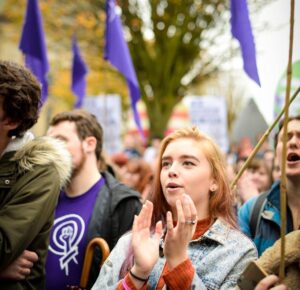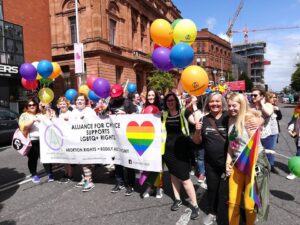Minds of the Movement
An ICNC blog on the people and power of civil resistance
by Leah ReaSeptember 28, 2022
The protest outside Belfast City Hall in June 2022 was a moving display of solidarity with activists in the United States in the bleak aftermath of the overturning of Roe v Wade. It was also yet another grassroots gathering in the ongoing struggle for abortion access in Northern Ireland.
Despite three years having passed since the repeal of harsh, historic legislation that criminalized abortion, a de facto political blockade still prevents women from receiving rights-compliant healthcare. Alliance for Choice, the grassroots nonviolent movement which led the challenge against the denial of reproductive healthcare, is now having to fight for the implementation of the very law the movement had successfully campaigned for.

Participants of an October 2017 march for abortion rights in Belfast. Credit: Alliance for Choice Facebook page.
Northern Ireland has a history of grassroots campaigning for the legalization of abortion and the advancement of reproductive healthcare rights. Alliance for Choice, formed in 1996, served as an umbrella under which activists and supporters from all communities in Northern Ireland could mobilize and organize against state failure to protect reproductive rights—and this unity is a significant achievement given the history of community polarization in Northern Ireland. Support is particularly strong among students, and university societies provide active organizational support.
Alliance for Choice’s initial objective was reforming the previous law criminalizing abortion, which was among the strictest in Europe. Sections 58 and 59 of the Offences Against Person Act 1861 allowed abortion only to protect the mother’s life, or where their mental/physical health was seriously at risk. Abortions were not legal in cases of fatal fetal abnormalities (FFA), rape, and incest.
Enforcement of the law produced high-profile prosecution cases. In 2016, a woman was given a suspended prison sentence for inducing her own abortion after her flatmates reported her to the police. A year earlier, a mother who had procured abortifacients for her teenage daughter was subjected to legal proceedings. The Northern Ireland Executive had not amended the law even when the Belfast High Court found the law violated human rights in 2015; the UK Supreme Court would later outline its majority view of human rights concerns arising from the law in 2018.
When the devolved government did not function between 2017 and January 2020, and following the UN Committee on the Elimination of Discrimination Against Women’s (CEDAW) determination that the law violated human rights, Alliance for Choice intensified its nonviolent campaign for implementation of legislative reform and additional legislative objectives in the area of reproductive justice.
On streets and in corridors for change

Credit: Alliance for Change Facebook page.
Using nonviolent demonstrations, rallies, advocacy, and civil disobedience, Alliance for Choice took to the streets to demonstrate the scale of grievance at the injustice of the abortion ban. The movement also organized protests outside courts where women were on trial for breaking the law. It organized coordinated lobbying of political representatives at both Stormont and Westminster, and empowered activists to question electoral candidates, producing a database to pressure political parties into action.
Perhaps most striking was Alliance for Choice’s use of civil disobedience. The movement purchased illegal abortion medication to supply to women who were seeking to terminate pregnancies but could not afford to travel to Great Britain to access healthcare services. Activists advertised their willingness to purchase the illegal medication and to receive it to prevent the prosecution of others. The movement subsequently challenged the state by informing police officers of their actions, seeking to be arrested to protest the law.
As political inaction continued, the movement escalated its demands to implore British politicians to intervene. Activists began to deliberately ingest illegal medication in front of the police. In 2018, activists took illegal medication at a protest rally, which prompted the police to move into the crowd of protesters. Officers attempted to forcibly remove one activist after she took a tablet; she was then surrounded by fellow activists forming a protective shield as the crowd shouted for the police to not arrest her. After a tense standoff, the officers withdrew from the scene. The withdrawal of the police was greeted as a symbolic victory by the movement, representing the power of activists directly confronting the state.
Legal reform is rarely enough

Alliance for Choice protest in July 2018 in solidarity with LGTBQ+ populations of Northern Ireland. Credit: Alliance for Choice Facebook page.
Such methods successfully produced new legislation in Northern Ireland. The process of introducing a legal framework for CEDAW-complaint abortion services started with the decriminalization of abortion in October 2019, and continued through British government-introduced regulations from March 2020. Yet, the law has yet to be fully implemented due to political logjam: the former First Minister had sworn to prevent the realization of the law and resist legal duties to deliver state abortion services. The former Minister of Health in 2021 maintained he could not introduce state services without executive approval, which has not been granted. Abortion services still have not been commissioned, and access is almost non-existent. Since 2020, people have been forced to travel or seek out backstreet abortion providers. Due to political preferences, intervention from the UK government to rectify this growing injustice has been limited.
Alliance for Choice now finds itself once more challenging the state, this time to implement the very law it had originally fought for and won. It has continued to engage in popular mobilization, most notably utilizing public pressure through its active social media since the emergence of the COVID-19 pandemic. Alongside public protests, it runs a support page to provide signposting and advice for abortion access, as well as abortion doula services and training, in defiance of the state. It once more faces the challenge of an absent local government and a distant national one, as well as hostile opposition, intimidation, and abuse.
As the movement continues to mobilize solidarity for women in the United States amid growing concerns about rights erosion at home, the movement urges activists to consider that social justice struggles do not end with legal reform, but rather, a new struggle begins: that of ensuring the state keeps its word.

Leah Rea
Leah Rea is a PhD candidate in Law at the Transitional Justice Institute, School of Law of Ulster University (Northern Ireland). A social justice activist and advocate, she is interested in the connection between nonviolent grassroots movements and human rights progression. She is an alumna of ICNC’s online course on civil resistance.
Read More